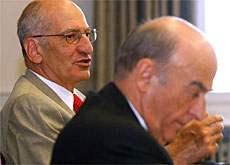Swiss politics seeks new direction

Switzerland’s politicians have been left scratching their heads after voters rejected government proposals for tax breaks, pension reforms and a rise in Value Added Tax last weekend.
Some of them are warning that the country’s cherished direct democracy could constitute a roadblock for future reforms.
May 16 was a dark day for Switzerland’s Centre-right parliamentary majority. More than two-thirds of voters turned down the proposals that had been approved by parliament.
The result was not entirely unexpected, with opposition coming from the Left, which feared cuts in social benefits, the cantons, who were facing a loss of revenue, and the conservative Right, which did not want a rise in VAT to help cover invalidity pensions.
Even so, the resounding defeat has prompted questioning by political analysts and journalists.
Weakened Centre
Most observers agree the political climate has changed. Last October’s federal elections saw a polarisation at both ends of the political spectrum.
Politicians at the Centre, who had defined the country’s policies over the years with a variety of alliances, are now isolated between the extremes.
With the rightwing People’s Party figurehead, Christoph Blocher, and the business-friendly Radical, Hans-Rudolf Merz, joining the government shortly afterwards, the balance of power in the seven-member coalition cabinet clearly shifted to the Right.
During the previous four-year legislature, parliament, government and voters agreed at the ballot box nine out of ten times. But so far this year voters have rejected six proposals submitted to a nationwide vote.
Distrust
Some analysts have argued that the latest vote results show citizens distrust the new parliament. Others point out that the government is too weak and that the country’s tradition of compromise blocks necessary reforms.
This last observation touches the very heart of Switzerland’s direct democracy.
Usually, the government drafts a law, but it goes through a consultation process whereby the cantons, representatives of the economy, non-governmental organisations and political parties all have their say.
The federal administration then gathers all these opinions together, before parliament modifies the new legislation within a framework of ever-shifting alliances.
But voters have the last word and if a new law does not satisfy a clear majority, it’s back to the drawing board for the authorities.
Too complex
For politicians on both the Right and the Left, a referendum is the best way of stopping their opponents.
For any project to make it past voters, it needs the backing of a broad coalition. But so far, parliament has failed to come up with pragmatic solutions to the country’s problems.
On May 16, Swiss citizens said “no” to the proposed reforms, but the issues they were supposed to deal with remain intact.
The population is still ageing, putting the country’s pension scheme at risk; the invalidity pension plan still has to climb out of the red; and married couples still pay more taxes than unmarried ones.
Since last weekend’s votes, politicians and analysts have been offering their solutions to the crisis. But only one fact seems to have emerged from all these opinions.
Nationwide votes must no longer be too complex, and citizens should not be asked to express themselves on proposals they do not fully understand.
swissinfo, Daniele Papacella (translation: Scott Capper)
On May16, voters turned down three government proposals, including tax cuts worth SFr2 billion for families, property owners and shareholders, reduce old age pension scheme benefits and increase VAT to prop up the national disability and pension schemes.
The government was also dealt a triple blow in February, when voters rejected plans on road planning, rent control and accepted a people’s initiative demanding life imprisonment for some violent offenders.
During the previous four-year legislature, voters had sided with the government nine times out of ten.

In compliance with the JTI standards
More: SWI swissinfo.ch certified by the Journalism Trust Initiative


You can find an overview of ongoing debates with our journalists here. Please join us!
If you want to start a conversation about a topic raised in this article or want to report factual errors, email us at english@swissinfo.ch.